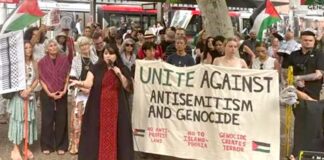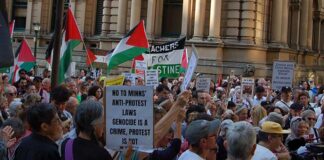Tom Orsag looks at the debates in the founding years of the ACTU about how to relate to migrant and overseas workers
Today’s debates around 457 visas, migrant workers and how unions should relate to them are not new. The issue of the union movement’s attitude to “foreign workers” and “foreign unions” was present at the formation of the ACTU 85 years ago, in early May 1927.
While some union leaders were supporters of excluding immigrants and backed the White Australia Policy, this view was far from hegemonic. In fact from the beginning there was support within the ACTU for welcoming migrant workers and trying to build unity between workers of all nationalities.
The idea of unions having a united national body gained strength out of the radicalisation of the working class after the horrors of WWI and the hope inspired by the Russian Revolution following the war.
Australia’s third highest level of strike days was in 1919, with 4.3 million, when the working class was one-third the size of today.
In response an All-Australian Trade Union Congress in 1921 called for the socialisation of industry and international solidarity with other working class movements.
According to labour historian Frank Farrell, “despite the divisions in the union movement… a majority of unionists retained a commitment to a socialist world view.”

When the ACTU was formed, it decided to set up a peace committee, “whose duty it shall be to establish a Bureau of Peace and to keep in close touch with the working class of all nations, particularly those bordering the Pacific, for the purpose of helping to prevent future war and to help bring about world peace.”
The ACTU decided to affiliate to the Pan-Pacific Trade Union Secretariat, which had been appointed at an international conference of unions held in Hankow, China, in May 1927. Opposed to war and imperialism, the Secretariat had close links to the Profintern, the pro-Russian international trade union movement also known as the Red International of Labour Unions. It is striking that the ACTU could make such a decision at a time when the Communist Party of Australia was extremely weak.
The Secretariat aimed to foster co-operation among trade unionists throughout Asia and the Pacific. That very aim was an affront to establishment racists and the supporters of the White Australia Policy within the labour movement.
One effect of affiliation with the Secretariat was that the ACTU began publication of a fortnightly paper, the Pan Pacific Worker. Its founding statements show its commitment to working class internationalism and support for migrant workers.
The paper declared, in its June 1929 edition, the need for militants to carry out a determined struggle against all forms of race hatred fostered by “capitalism and reformism.”
The paper recognised the principle that people should have the right to emigrate freely between countries, irrespective of race, and argued it was the duty of Australian unionists to bring all migrants who came to Australia into the union movement.
This was at a time where many unions, including the AWU had a “colour” bar which excluded Asians from membership.
Fight over White Australia
The decision to affiliate to the Pan-Pacific Secretariat saw the AWU campaign against what it saw as the ACTU’s “anti-White Australia” policy. The AWU’s 1926 Annual Convention condemned immigration as a threat, denouncing “the southern European menace”.
Ted Grayndler, the union’s general secretary, told its 1930 Annual Convention that the Secretariat’s desire to remove racial barriers would be, “an open door for the coloured hordes of the North Pacific.”
The ACTU President W. J. Duggan responded by saying the ACTU did support the White Australia Policy and denied affiliation with Pan-Pacific Secretariat indicated otherwise.
Yet one of the Secretariat’s founding principles was non-discrimination on the grounds of race. It called the White Australia Policy “viciously anti-working class” and advised that ACTU office bearers should pledge themselves “to tear down the barriers that heretofore separated the toiling masses of the East from the Labour movement of the West, and all the racial and national prejudice artificially created by Imperialists and their hirelings”.
The stage was set for a fight at the ACTU Congress of July 1928. Three distinct political trends fought it out for the direction the ACTU would take.
On the right was the AWU, Australia’s largest union, rural-based and run as a fiefdom by its conservative leadership. The AWU split away from the All-Australian Trade Union Congress after 1921 because it was too left-wing. The AWU aligned itself to the Labor Party’s efforts to tame the “socialist excesses” of the union left.
The Melbourne Trades Hall Council (THC) led by its President, H C Gibson, of the Federated Engine Drivers and Firemen’s Association (FEDFA) and Robert S Ross, of the Federated Clerks’ Union allied themselves with the AWU. Gibson argued against the, “Damned impertinence for a heterogeneous mob of Asiatics with unpronounceable names to lay down a policy of the ACTU.”
In the centre were the bulk of trade union officials, loyal to the Labor Party, some having moved to the left as the working class did after WWI.
On the left were unionists in the Communist Party of Australia (CPA) and left Labor officials. Some were like Jock Garden, Secretary of the NSW Labour Council and his allies, who had been in the CPA in the early 1920s but were now moving into the Labor Party. Left wing unions from NSW were the most forthright advocates of socialisation and internationalism.
The CPA argued for the common struggle of the working class against the capitalist class, for “the unity of workers of all lands irrespective of nationality colour or creed” and for “a united struggle against capitalism and imperialist war.”
In the end, the vote was overwhelming 96 to 36 to stay affiliated. This was a result of the firm internationalists in the union movement blocking with those that shared a confused position similar to that of the ACTU President.
Many of them argued in support of affiliation with the Pan Pacific Secretariat on the ground that it meant supporting workers’ struggles abroad, but did not imply support for increased immigration.
After the ACTU conference the right continued to agitate against affiliation. At the Melbourne THC, Ross moved that the ACTU disaffiliate from the Secretariat. After four weeks of discussion, he lost the vote 59 to 62. Ross’s own Clerks Union instructed him to withdraw the motion of disaffiliation, which he ignored.
When the Tramways Union voted to withdraw from the Brisbane TLC on the basis of the ACTU’s affiliation to the Secretariat, the Brisbane Builders’ Labourers Union voted to instruct their union to appoint a speaker to address the Tramways Union at their next meeting to reconsider the decision.
Labor and the CPA
The AWU, with its links to Labor MPs, turned to them to help discipline the ACTU. It appealed for their support by claiming the ACTU intended to destroy the White Australia Policy. Labor leader James Scullin declared that the Labor Party, “was a strong as ever for the policy.”
In October 1929, Scullin was elected Prime Minister as the Great Depression began. This meant the pressure on the ACTU to toe the Labor Party line increased.
Scullin promised the unions favourable changes to the arbitration system. In return, the Labor government wanted concessions from them. The Sydney Morning Herald reported in February 1930 of the efforts of senior Labor Party figures to influence the ACTU to move away from the internationalism of the Pan-Pacific Secretariat.
Around the same time, the CPA adopted a new policy turn, the Third Period, which saw new leaders more loyal to Stalin, Lance Sharkey and J B Miles, take over the CPA.
The Third Period meant a policy of extreme hostility towards the Labor Party and its membership. Henceforth, they were considered worse than fascists and labelled “social fascists”, to be denounced at every opportunity.
The new policy meant the CPA was incapable of working with the left of the Labor Party, let alone winning over those further to the right, to maintain the affiliation to the Secretariat.
The ACTU buckled and disaffiliated from the Pan-Pacific Secretariat in March 1930, but only by 80 votes to 75. For the first time it also voted to openly support the White Australia Policy. It remained a poisonous and divisive tool for the capitalist class for another 35 years.
The AWU’s paper The Australian Worker crowed in March 1930, “At long last the ACTU has made up its mind to cut adrift from the Communist-controlled black, brown and brindle outfit known as the Pan-Pacific Trade Union Secretariat.
“The Worker pointed out, too, that the Secretariat was openly hostile to the White Australia Policy and other fundamental principles of the Australian Labor Movement.
“By it decision to withdraw its affiliation…The ACTU has wisely concluded that” the “welfare of Australian workers must not be dictated by a gang of coloured revolutionaries.”
Today unions are among the most multi-racial organisations in society, uniting migrants from a whole range of backgrounds to fight for wages and rights at work. Many unions are strong supporters of refugee rights, and even the leader of the still conservative AWU, Paul Howes, has been a supporter of Labor for Refugees.
Over decades, the left in the union movement including socialists and the CPA have fought for a principled stand of working class internationalism and to welcome migrant workers. The arguments that were raised in the early years of the ACTU, in support of migrants and organising them into the unions, have continued relevance today.
In the context of calls for “Aussie jobs” and the danger that anti-migrant ideas will spread amongst the working class the fight for unity among migrant and local workers to fight profiteering bosses has renewed importance.





